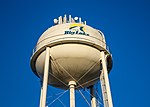Monticello High School (Minnesota)
Monticello High School is a public high school located in Monticello, Minnesota, United States. It is a part of the Monticello School District. The Principals are Matthew Coalwell and Lori Hanson. The current high school was constructed in the late 1990s by architects Rego and Youngquist and officially opened in September 1999. Monticello High School (enrollment 1298) is Wright County's third largest school. The nickname for the school's athletic teams is the Magic. Monticello residents appreciate and expect a high level of service from their Community Education Department and school recreation programs. In an effort to maximize communication with parents, Monticello High School utilizes an on-line program called Parent Portal where parents can access student grades, attendance, and assignments. Also, community demand for recreation opportunities is high.
Excerpt from the Wikipedia article Monticello High School (Minnesota) (License: CC BY-SA 3.0, Authors).Monticello High School (Minnesota)
School Boulevard, Monticello Township
Geographical coordinates (GPS) Address Nearby Places Show on map
Geographical coordinates (GPS)
| Latitude | Longitude |
|---|---|
| N 45.2866811 ° | E -93.7780077 ° |
Address
School Boulevard
55362 Monticello Township
Minnesota, United States
Open on Google Maps








